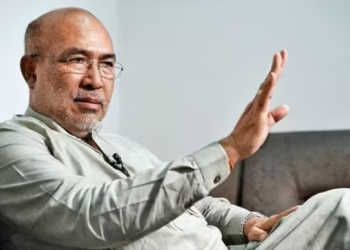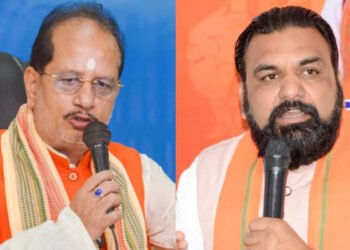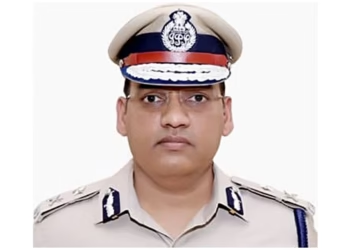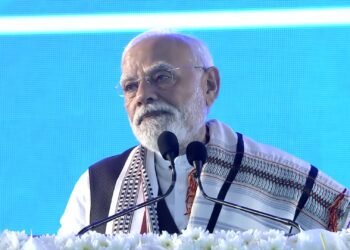Army Chief announced the establishment of the Rudra Brigade, an integrated unit comprising infantry, mechanized infantry, armored units, artillery, special forces, and unmanned aerial systems, designed to provide comprehensive combat and logistical support.
By PC Bureau
India marked the 26th Kargil Vijay Diwas with solemn tributes to the brave soldiers who secured a decisive victory against Pakistani forces during the Kargil War in 1999.
The nation paid homage to the 545 martyrs who laid down their lives to reclaim strategic heights in the Drass, Kargil, and Batalik sectors of Ladakh, celebrating their unparalleled courage and sacrifice.
Prime Minister Narendra Modi, President Droupadi Murmu, Defence Minister Rajnath Singh, Home Minister Amit Shah along with CDS General Anil Chauhan and service Chiefs led the nation in honoring the fallen heroes.
Leader of the opposition in the Lok Sabha, Rahul Gandhi and Congress President Mallikarjun Kharge also extended their heartfelt greetings to the brave soldiers of the Armed Forces, ex-servicemen, their families and all fellow Indians.
Union Minister Mansukh Mandaviya, Minister of State for Defence Sanjay Seth, and Ladakh Lieutenant Governor Kavinder Gupta visited Drass and laid wreaths at the memorial, a symbol of the soldiers’ indomitable spirit.
Army Chief General Upendra Dwivedi, alongside other top military officers, paid floral tributes, while the next of kin of the martyrs and local residents gathered as early as 6 AM to offer their respects.
The ceremony was marked by poignant moments, including a helicopter flypast that showered flower petals over the memorial and the stirring Last Post ceremony, signaling the culmination of the wreath-laying.
Various events were organized at the memorial to commemorate the bravery of India’s warriors, whose legacy continues to inspire generations.
Operation Vijay: A Triumph Over Adversity
Kargil Vijay Diwas celebrates the success of Operation Vijay, the Indian Army’s fierce counter-assault launched in 1999 to evict Pakistani intruders who had stealthily occupied key heights in Ladakh. Fighting in treacherous terrains under extreme weather conditions, Indian forces displayed extraordinary valor to reclaim the occupied positions, securing a decisive victory by July 26, 1999. The war remains a testament to the resilience and determination of India’s armed forces.
READ: Mahadayi’s Curse: The River That Fuels Rivalry and Hope
Addressing a gathering at the Kargil War Memorial, General Upendra Dwivedi hailed the sacrifices of the soldiers, stating, “The nation is safe due to the heroes who fought at these icy heights. Their dedication and determination allow us to live with dignity and peace.”
Reflecting on the silver jubilee celebrations attended by Prime Minister Modi in 2024, he emphasized that Vijay Diwas is not just a military commemoration but a national festival.
Operation Sindoor: A New Normal of Decisive Action
In his address, General Dwivedi highlighted Operation Sindoor, a series of surgical strikes conducted as a response to the Pahalgam terror attack, which he described as “a deep wound for the nation.”
The operation, he said, sent a clear message to Pakistan: “Supporters of terrorism will not be spared.”
The Indian Army eliminated nine high-value terrorist targets in Pakistan with zero collateral damage, effectively dismantling terror infrastructure.
“Operation Sindoor was a decisive victory, showcasing India’s ability to target terrorist networks while foiling Pakistan’s aggressive moves,” Dwivedi stated.
He underscored that India’s “stern response” to adversaries has become the “new normal,” reflecting the nation’s resolve to protect its unity, integrity, and sovereignty. He added, “Any power that challenges India or harms its people will face a befitting reply.”
The Army Chief also referenced Pakistan’s actions on May 8 and 9, which were met with robust defense.
“Our army air defense stood like an impregnable wall, unbreached by missiles or drones,” he said, affirming India’s military prowess. Despite offering peace, he noted, Pakistan resorted to “cowardice,” which was countered decisively.
Modernizing the Indian Army
General Dwivedi outlined significant advancements in the Indian Army’s capabilities, signaling its transformation into a global force.
He announced the establishment of the Rudra Brigade, an integrated unit comprising infantry, mechanized infantry, armored units, artillery, special forces, and unmanned aerial systems, designed to provide comprehensive combat and logistical support.
The Bhairav Light Commando Unit, a special strike force, was also introduced, described as “always ready to surprise the enemy at the border.” Further modernization includes equipping every infantry battalion with a drone platoon and establishing the Shaktiban Regiment within the artillery, which will feature drones, counter-drone systems, and loitering munitions. The Army’s air defense systems are being upgraded with indigenous missiles, significantly enhancing operational capabilities. “Our strength will increase manifold in the coming days,” Dwivedi asserted.













